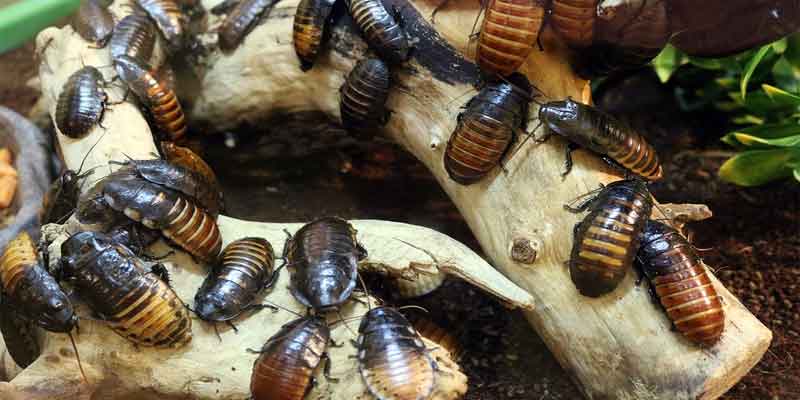Dubia roaches are a popular feeder insect for reptiles, amphibians, and birds. They are high in protein and low in fat and make an excellent addition to any chameleon diet.
In this article, we will discuss the benefits of dubia roaches as a food source for your chameleon, how much they should be given each day, and whether or not baby chameleons can eat them.
Table of Contents
Can Chameleons Eat Dubia Roaches?
If you have a chameleon, you know that it needs the right food to stay healthy. Dubia roaches are a great choice for your chameleon! They’re high in protein and calcium, two nutrients that keep your pet feeling its best.
Dubia roaches are also an excellent source of vitamins and other nutrients, which help support their immune system. And because they’re low in fat and high in protein, they won’t cause digestive issues like some other types of feeder insects can.
Benefits of Dubia Roaches for Chameleons
Dubia roaches are live insects that make an excellent food source for lizards, amphibians, and other insectivorous pets. They are hardy insects that can tolerate fluctuations in temperature and humidity better than crickets, mealworms, or superworms.
The benefits of dubia roaches for chameleons include:
High protein content – Dubia roaches contain a higher percentage of protein than other insect species, making them an ideal option for chameleons that need to put on weight quickly such as gravid females or young growing animals. They also have a lower fat content than other insects making them suitable for mature adults as well as juvenile animals during periods when they are not actively growing.
Easy to digest – Dubia roaches are easier to digest than other species of insects which makes them an excellent choice for herbivorous reptiles such as bearded dragons who do not have the ability to properly digest plant matter in their diet.
Dubia roaches are easy to breed and maintain. One adult female can produce up to 6 egg crates per month. You can get started with just one or two boxes of dubia roaches, so they’re ideal if you don’t want to invest too much money at first or if you’re still getting the hang of breeding insects in general.
Can Baby Chameleon Eat Dubia Roaches?
Baby chameleons can be fed dubia roaches, which is a popular feeder insect among reptile hobbyists.
The best way to feed your baby chameleon is by hand, but if you don’t want to touch them, you can use tweezers or tongs (I don’t recommend using toothpicks). Make sure that the roach is small so it won’t cause your baby chameleon to choke on them.
How To Feed Dubia Roaches To Chameleons
There are a few different ways that you can feed Dubia roaches to your chameleons. The most common method is to place the roach in the enclosure with your pet, who will eat it as he sees fit. Another option is to place them on a dish in the enclosure and allow your chameleon to come out and eat them at his leisure.
When feeding Dubia roaches to your chameleon, always use tongs or tweezers so that you do not accidentally crush or otherwise harm the insect while handling it. You should also wear gloves when handling the roaches because they have been known to carry bacteria that can be transferred through contact with human skin.
You should never leave any food out for more than 24 hours before removing it from its container or dish because this may cause mold growth or spoilage of any remaining food items left behind. Store all unused portions of Dubia roaches in sealed plastic bags until they can be disposed of properly by placing them in the trash outside of their enclosures.
How Much Dubia Roaches Can Chameleons Eat
Chameleons are incredibly meat eaters, so they need a lot of food to keep them healthy. When feeding your chameleon, make sure you do not overfeed them because this can cause serious health problems and even death. It is recommended that you feed your chameleon twice a week or once every two weeks depending on their size, age, and activity level.
Make sure that all insects are gut loaded before feeding them to your pet so they will have plenty of nutrients in their bodies at the time when being consumed by your pet!
The Benefits of Gut Loading Dubia Roaches
In order to obtain the maximum benefits of a gut-loading protocol, you should feed your insects nutritious foods prior to feeding them to your pet chameleon.
The process of feeding your pets nutritious foods prior to feeding them insects is known as “gut loading”. Gut loading is especially important for baby chameleons because their small body size makes it difficult for them to absorb sufficient nutrients from their food in order for them to grow properly. By providing young chameleons with a good diet, you can help them thrive and stay healthy throughout life.
Conclusion
In conclusion, you should know that chameleons are omnivores and they can eat a variety of different insects and vegetables. By offering them Dubia roaches in your enclosure, you will greatly benefit from the nutrients they contain. They also offer a great source of protein which is essential for growing baby chameleons and adults alike!

